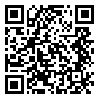BibTeX | RIS | EndNote | Medlars | ProCite | Reference Manager | RefWorks
Send citation to:
URL: http://jdisabilstud.org/article-1-3331-en.html
2- Assistant Professor, Department of Psychology and Education of Exceptional Children, Faculty of Literature, Humanities and Social Sciences, Science and Research Branch, Islamic Azad University, Tehran, Iran
Abstract
Background & Objectives: Childhood can be considered the most crucial period of every person's life. This period is spent with the family. A warm and authoritative family can have positive effects on children's mental health. However, the presence of conflict, family violence, poverty, and addiction in the family leads to a decrease in mental health and an increase in behavioral disorders in children. The results of previous studies indicate that children with behavioral disorders have many personal and social problems, two of which are cognitive emotion regulation and social skills. Thus, it is very important to use appropriate methods to improve these variables. One of these effective methods is creative drama. Therefore, this research aimed to determine the effectiveness of creative drama on the cognitive emotion regulation and social skills of girls with behavioral disorders aged 10 to 12 years.
Methods: This quasi–experimental research employed a pretest–posttest design with a control group. The statistical population of the present study comprised all girls with behavioral disorders aged 10 to 12 living in Tehran City, Iran, in 2023. Among the statistical population, 20 qualified volunteers were recruited and randomly assigned to the experimental and control groups (each group includes 10 girls). The inclusion criteria were as follows: obtaining the entry score of behavioral disorders based on Child Behavior Profile–II (Achenbach & Edelbrock, 1979), being in the age range of 10 to 12 years, being interested in participating in the research, and lacking serious speech, physical and movement problems affecting the process of the sessions. The exclusion criteria were absenteeism of more than three sessions, non–observance of group therapy rules, and incomplete tests in the research. This research observed ethical standards including obtaining informed consent and guaranteeing privacy and confidentiality. Also, when participating in the research, the participants were free to withdraw from the research at any time and provide personal information. They were assured that the information would remain confidential and that it would be fully respected. After the end of the research, some creative drama training conducted in the experimental group was also implemented for the control group to maintain ethical standards. Both groups completed the Cognitive Emotion Regulation Questionnaire (Garnefski et al., 2001) and the Social Skills Rating System–Teacher Form (Gresham & Elliot, 1990) in the pretest and posttest. The creative drama program was implemented in the experimental group as a 12 session's 60–minute and twice a week, but the control group did not receive any treatment plan. Data analysis was carried out in two parts: descriptive and inferential statistics. At the level of descriptive statistics, frequency, mean, standard deviation, and the level of inferential statistics, analysis of covariance was used. Data analysis was done in SPSS software version 26, and the significance level of the tests was considered to be 0.05.
Results: The results showed a significant difference in all three variables of adaptive strategies, maladaptive strategies, and social skills between the experimental and control groups in the posttest after removing the effect of the pretest (p<0.001). Also, creative drama increased adaptive strategies by 26% and social skills by 87% and decreased maladaptive strategy by 65%.
Conclusion: Based on the research findings, creative drama training for students with behavioral disorders is suitable for improving their cognitive emotion regulation and social skills.
| Rights and permissions | |
 |
This work is licensed under a Creative Commons Attribution-NonCommercial 4.0 International License. |



